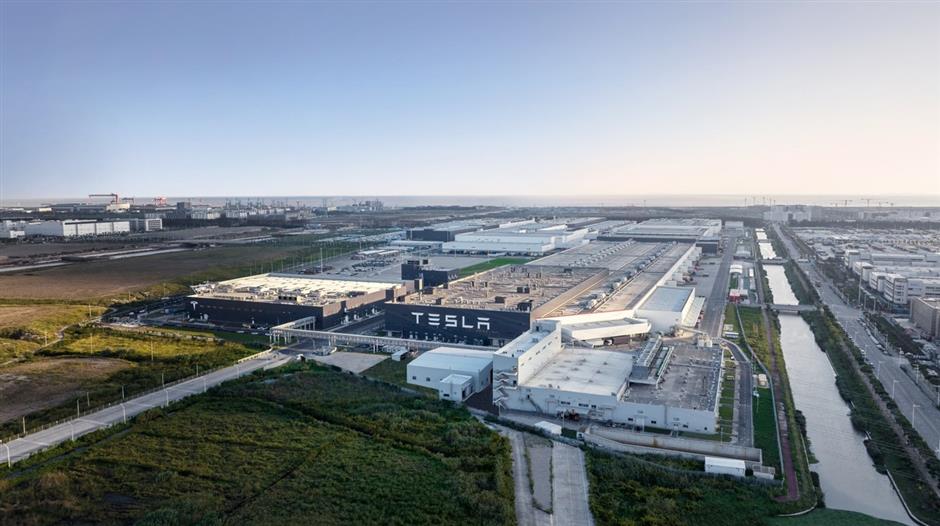
Growth Goes Green
China's economic miracle was once viewed as a calamity for the environment, but the nation has achieved what was once thought impossible: achieving growth while protecting the natural world. This series explores how the world's second-largest economy is reducing its carbon footprint even as its economy powers ahead.

Shanghai is the only metropolis in China to have an exhibition hall dedicated to promoting low-carbon living and manufacturing.
When China embarked on a national campaign toward carbon neutrality, Shanghai was quick to answer the call, becoming a national trend-setter in eco-friendly policies.
It has cleaned up the once heavily polluted Suzhou Creek and cleared the skies of once heavy smog, recording 323 days last year with excellent air quality. It has built 973 parks and 230 kilometers of greenbelts, and turned a bird habitat on Chongming Island into a World Heritage Site.
At the street level, Shanghai residents have become environmentally conscious, embracing municipal programs to sort garbage for recycling and encourage electricity use in off-peak hours. The city operates a carbon-credit trading market and is the only metropolis in China to have an exhibition hall dedicated to promoting low-carbon living.
Carbon is the 15th most abundant element on the Earth's surface, and some of its myriad compounds are the building blocks of life. But when combined with oxygen and release into the air in great quantities, carbon dioxide becomes a greenhouse gas linked to global warming.
Businesses heed the call
The emphasis on carbon neutrality has meant that businesses in the city have to reduce their carbon footprint.
Evidence of their progress is mounting. Shanghai-based textile company Orient International is now exporting apparel made from low-carbon materials. M&G Stationery is gaining bidding advantage with government agencies with its eco-friendly office supplies. XuanAo Hotel has become Chongming Island's first carbon-neutral rural resort hotel.
China has among the most aggressive green goals in the world, pledging to reach peak carbon emissions by 2030 and net zero by 2060. It has invested heavily in solar and wind energy, accounting for more than half of green-energy installation globally, and in development of green technologies across industrial sectors.
Patricia Xia, a Central China managing partner at consulting firm EY, praised Shanghai as a leader in the green movement, adopting carbon strategy blueprints and turning them into action plans in the past 20 years.
"For companies, pursuing carbon neutrality is not only a necessary response to global climate action, but also presents an opportunity to enhance long-term competitiveness and unlock new sources of business growth," Xia said.
A range of businesses in different sectors contribute to the ecosystem transformation, from those advising on calculating carbon emissions to institutions financing low-carbon technologies.
"China has a clear vision about the carbon industry, which has become a consensus that every business should carry out carbon management," said Huang Yanxiang, chief executive of Shanghai-based Carbon Newture, which provides analysis and solutions for companies on green strategies.

Carbon-footprint reports of Carbon Newture are expected to help Chinese enterprises expand overseas with credible data.
Established in 2021, Carbon Newture tracks corporate carbon emissions and certifies companies that meet standards. Its carbon-footprint reports for clients contain detailed breakdowns on factors such as composition of raw materials used in production, energy used to power machinery and polluting levels of goods transport.
"Our core strength are software tools that leverage technologies, such as Internet of Things, big data, artificial intelligence and blockchain, to guarantee precise calculation of the carbon-emission footprint, which is first and foremost for carbon management," Huang said.
Carbon report for every company?
"As Chinese companies grow in awareness of their carbon footprint, we are very confident of a future where every company will have its own carbon report," Huang said.
For Carbon Newture, helping companies meet environmental standards is a profitable business, which may lead it to the heights of US-based Watershed, a similar firm that was founded in 2019 and already has a valuation of US$1 billion.
"Compared with Watershed, we have more companies to serve in China," Huang said. "And we are finding that a lot of Chinese companies are doing well in carbon management – our reports prove that."
Carbon Newture reports, recognized by international authoritative institutions such as TÜV SÜD and SGS, and are in line with carbon footprint standards including ISO 14067, have helped dispel the overseas stereotype of Chinese manufacturers as polluters.
"China for years has been calling for energy conservation and emission reduction – the prelude to carbon neutrality," Huang said. "Both factors can serve the interests of companies in saving costs and increasing profits. Thus, Chinese companies have been doing a good job of it for a long time. We are just providing the evidence."
Progress is seen across corporate sectors.
Green methanol development
Shanghai Boiler Works Co, a unit under state-owned Shanghai Electric, has invested billions of yuan in the production of green methanol, which uses renewable energy sources such as wind power and biomass to offer a cleaner alternative to conventional marine fuels.

A corner of Shanghai Boiler Works Co is seen with sign boards showing its development on renewable energy sources.
In July, it loaded the first cargoes of green methanol onto a vessel bound for France – marking China's entry into the global green methanol market.
Only methanol with life-cycle emissions below 0.7 tons of carbon dioxide per ton qualifies as "green." Shanghai Boiler's output meets EU standards with a 65 percent carbon reduction over fossil methanol.
"It's a milestone because very few companies around the world can manage a complete production cycle of the methanol, and the demand for the green fuel far exceeds supply," said Ni Jianjun, deputy manager of Shanghai Boiler Works.
"Our first step is to test the waters in the Europe market, where carbon pricing is relatively high, but our ultimate goal is the vast Chinese market," Ni said.
China's green offensive has proven a magnet for global companies like Tesla, which produces electric cars at a Shanghai mega-factory and is building a US$556 million battery-powered energy storage plant in the city that will have capacity of nearly 40-gigawatt hours – enough power to provide electricity to 13,000 households for a year.
"If all this energy comes from clean sources, it can reduce at least 20,000 tons of carbon dioxide emissions," said Dong Kun, general manager of Tesla China's energy business.

Tesla has launched a US$556 million battery-powered energy storage plant in Shanghai's Lingang Special Area beside its benchmark mega-factory for electric cars.

